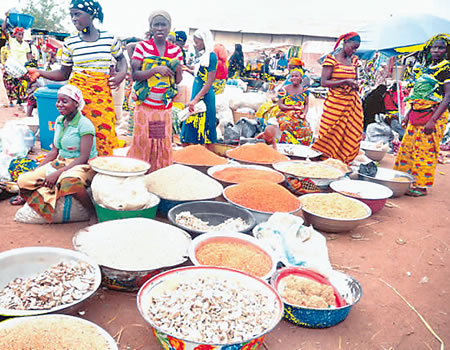THE closure of Nigeria’s borders with neighbouring Benin Republic is hurting the prices of staple foods in Lagos and its environs, Saturday Tribune findings have shown.
Survey showed that prices of both foreign and locally-produced rice have jumped up with traders citing the closure of the borders as the main reason for the hike.
Food items, particularly rice, imported frozen chicken (popularly known as Orobo), turkey and gizzard, were regularly smuggled into the country through the Seme border, the boundary between Nigeria and the Republic of Benin, before the closure.
Nigeria loses N345m in 12days over South-West border restrictions
The French-speaking nation is a major recipient of food importation from France, now serving as a major importation hub of goods into Nigeria.
Apart from foreign rice being not as available as it used to in the Ikeja (Lagos) axis, including Shangisha and Magodo, local rice also witnessed a jack-up in price.
The border closure is also taking its toll on various markets in the state with market women lamenting the scarcity of frozen foods and grains.
Traders who deal in food items imported from Benin Republic have lamented the closure of the borders, saying it has resulted in price increase of major food items and a slowing down of sales.
Some of the traders who spoke to Saturday Tribune on Friday said until Nigeria attained food sufficiency, closing the nation’s borders would put the poor masses under intense hardship.
A foodstuff seller at Bodija Market, Ibadan, Alhaji Umoru Kabir, told Saturday Tribune that before the closure of the borders, a 50kg bag of imported rice sold for N14,000 but it sold for between N17,000 and N18,000 as of Friday.
He said further that the development had affected the price of local rice, a 50kg bag of which used to be N12,000 but has now increased to between N14,000 and N15,000.
He noted that Nigeria was not yet ripe for such a policy as the country’s agriculture system was still developing and had not attained a level that could guarantee food security.
“I advise the Federal Government to review its decision and reverse it without wasting time,” he said.
Mrs Bunmi Owolabi, who sells vegetable oil and other groceries at Amunigun market, Ibadan, told Saturday Tribune on Friday that a 25-litre keg of imported vegetable oil which was sold for N9,400 before the border closure now sold for N12,500.
She stated that the border closure had also affected other food items such as frozen chicken, turkey and confectioneries.
At Alarape Market in Somolu Local Government Area of Lagos State, Ndubisi Eze, a trader, said there had been increase in the prices of food items due to the border closure.
According to him, there has been a N3,000 increase in the price of a bag of rice compared to what it was before the border closure.
“Honestly, the border closure has made life difficult for both traders and buyers due to the accompanying price hike of food items, especially rice.
“Only beans has not experienced a price increase as the price remains the same, compared to the preceding weeks. The selling price of a bag of beans remains N14,000.
“As of last week, a bag of rice sold for N14,500 but is now going for N17,500,” he said.
A rice seller at Bariga Market, Ishola Abiodun, gave a similar account, blaming the increase on the border closure.
“The border closure led to a hike in the price of the major staple food, rice, because we are not producing enough in the country. If we were producing enough locally, the closure would not have any impact on the price. For instance, the price of beans has not changed but for rice and vegetable oil, there has been an increase in their prices,” Abiodun said.
He, however, noted that the price might further go up if the borders remained closed for long.
A groundnut oil seller at the same market, Mrs Ajayi Oriade, corroborating Abiodun’s position, said the difference between the amount a gallon of oil sold for before the closure and currently was N1,300.
She explained that the price of the Cotonou-made product, Shivia, had also gone up.
“As of last week, a gallon of Shivia groundnut oil sold for N10,200 but now it is selling for N11,500,” she said.
Lamenting the effect on her business, Mrs Kashfat Ismaila, who sells frozen foods, rice and gari at Bammeke, Lagos, said since the closure of the borders, many of her customers had been disappointed as they could not get items suc as chicken, garri and fish to buy.
Ismaila, who said she had been running at a loss due to the non-availability of frozen foods, added that she had been forced to ration the little left in her shop.
The same is applicable to the availability of rice which has now become essential commodity.
Many of those who have rice in their shops are now hoarding it, while those still selling are doing so at exorbitant prices.
According to Mrs. Ismaila, a bag of rice that used to cost N14,000 now sold for between N15,000 and N17,000, while a kilo of chicken that used to sell for N900 now sells for N1,200.
For Mrs Shade Saliu, the sudden closure of the borders had made some people poorer while others have been made richer overnight.
She cited those selling rice in large quantity around Egbeda who now use the opportunity to enrich themselves as they have increased the prices of the commodity by 200 per cent.
The same thing, she said, applied to groundnut oil which, before now, she used to bring in from Benin Republic and sell at cheaper rates ranging from N250 and N350 per bottle which she now claimed she sells for N450.
While appealing to the Federal Government to review the issue, Saliu expressed support for the reasons behind the closure but faulted the manner in which the decision was taken without putting an alternative on ground.
She cited how those who produced such commodities as chicken and rice were now capitalising on the situation to exploit Nigerians who have no choice but to patronise them.
At the Ajuwon area, imported rice reportedly sold for between N15,000 and N16,000 per bag but now goes for N17,000 and N17, 500.
Derica measurement that used to be N250 is now N280, while turkey of N1,100 per kilo before now is now N1,500 per kilo.
Experts warn of food crisis over forex ban
The country’s plan to spend less on food by restricting access to dollars for importers could have the opposite effect by threatening food supplies and pushing up prices, Bloomberg reported on Friday.
President Muhammadu Buhari ordered the Central Bank of Nigeria (CBN) on August 13 to stop dollar supply for food imports, saying food security had been achieved and agricultural production had increased. That came after the CBN governor, Godwin Emefiele, said in July that the apex bank planned to cut off dairy importers’ access to foreign exchange in a bid to bolster domestic milk output.
The food price index in Africa’s largest oil producer has risen almost 80 per cent since the start of 2015, pushing inflation above the central bank’s target and putting pressure on households’ finances in a country where about 60 per cent of consumption spending goes to food.
“Many of us are agitated by this food import ban. Food will become scarce and very expensive,” said Abosede Ogungbemi, who sells imported rice, wheat and other food items in the Federal Capital Territory (FCT), Abuja
The CBN already restricts access to dollars for the import of 40 kinds of items from cement to soap. In June, Buhari reportedly instructed the CBN to blacklist companies or individuals caught illegally importing palm oil or other prohibited goods such as poultry.
Nigeria spent about $1 billion importing food and live animals between January and March, according to a statistics agency. Domestic food-supply chains have been disrupted by a decade-long Islamist insurgency in the North East. Clashes between herdsmen and farmers have also decimated communities, destroyed crops, killed cattle and forced producers to flee to protective camps in northern and central regions.
“Many families have abandoned their farms and the crops on them have either been stolen or destroyed by war or abandoned,” said Henry Kam Kah, a senior history lecturer at the University of Beau in the south-west region of Cameroon.
Still, Buhari and Emefiele insist Nigeria can produce all the food it needs, and the dollar ban will help with that. That’s even as large quantities of rice and other goods are being smuggled into the country, according to the president.
The director of Abuja-based Turgot Centre for Economic Policy Research, Nonso Obikili, said: “The restriction is certainly counterproductive. Nigeria currently does not grow many of the key food products we consume and such a restriction will likely have the dual effect of higher food prices and increased smuggling.”
The United Nations’ Food and Agriculture Organisation said last year that Nigeria was one of 37 countries in need of external food assistance.
“We can’t produce enough food. Banning food imports without supporting farmers and creating an enabling environment to produce food on a large scale is condemning Nigerians to hunger,” said Suleiman Adulaziz, a wheat grower in Borno State.






